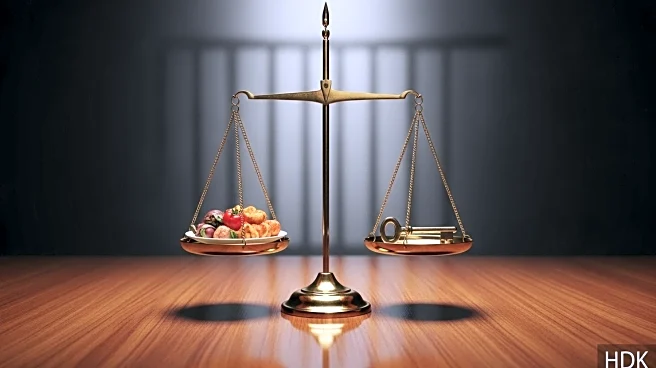What's Happening?
The Israeli Supreme Court has issued a rare ruling mandating the government to improve the food provision for Palestinian prisoners. This decision comes amidst the ongoing Israel-Hamas conflict, which began with Hamas' attack on southern Israel on October 7, 2023. The court found that the Israeli government had deprived Palestinian detainees of a minimum subsistence diet, ordering authorities to provide three meals a day to ensure basic survival conditions. The ruling was in response to a petition filed by the Association for Civil Rights in Israel and the Israeli rights group Gisha, which highlighted the government's policy of restricting food for prisoners, leading to malnutrition and starvation. The court's decision challenges the stance of Israeli National Security Minister Itamar Ben-Gvir, who had previously boasted about degrading prisoner conditions to the legal minimum.
Why It's Important?
This ruling by the Israeli Supreme Court is significant as it addresses humanitarian concerns amidst the Israel-Hamas conflict. It highlights the tension between security measures and human rights obligations, potentially influencing international perceptions of Israel's conduct during wartime. The decision may impact Israel's diplomatic relations, as it responds to growing international criticism regarding the treatment of Palestinian prisoners. Human rights organizations view this as a step towards accountability and improved conditions for detainees, which could lead to broader discussions on the treatment of prisoners in conflict zones. The ruling also underscores the role of the judiciary in balancing national security interests with human rights standards.
What's Next?
Following the court's decision, the Israeli government is expected to implement changes in the food provision for Palestinian prisoners. Human rights groups, including ACRI, are likely to monitor the situation closely to ensure compliance with the ruling. The decision may prompt further legal challenges regarding other aspects of prisoner treatment, such as medical care and living conditions. Additionally, the ruling could influence public opinion and political discourse within Israel, potentially leading to debates on the government's policies during the conflict. International observers may also increase scrutiny on Israel's actions, affecting its diplomatic engagements.









